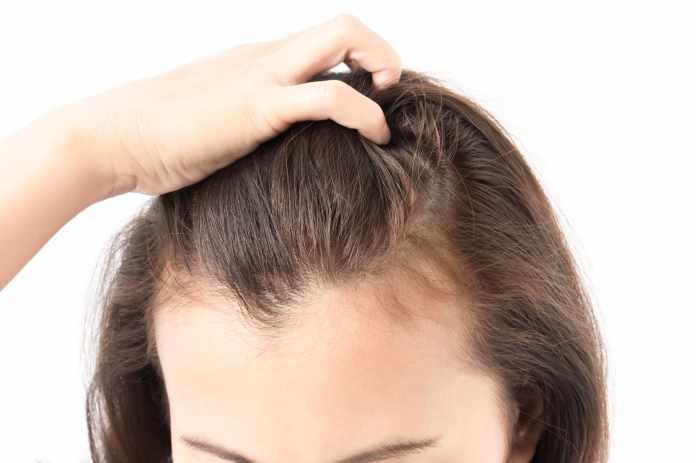Psoriasis is a skin disorder that causes red bumps and white scales. It occurs very commonly on the face, feet, palms, back, elbows, scalp, knees, and soles. The scaly patches on the head multiply quickly and affect the forehead and ears. A dermatologist best prescribes the right psoriasis of the scalp treatment after examining the disease’s extent.

Sometimes the patches appear only at one area of the body. These bumps might get limited to isolated skin surfaces only. But in other patients, the plaques can affect larger areas and spread fast. So, the skin doctor carries out a thorough examination and specifies an effective treatment modality.
Main causes
This skin disorder is not contagious and does not spread from one person to another. Poor immunity can be a major cause of this problem. The best psoriasis of the scalp treatment depends on the primary cause of the disorder. The most common reasons are,
- Skin infections and strep throat can lead to painful abscesses.
- Cold and dry weather conditions are another cause of concern.
- Stress can reduce immunity and cause patches and plaques.
- Lifestyle choices, such as smoking and alcohol are problematic.
- Skin injuries like bug bites, sunburn, cuts, and scrapes can also be an inducing factor.
- Medications for high BP, malaria, and others are potential causes.
- Quickly withdrawing the usage of systemic and oral corticosteroids can also trigger such a reaction.
Know the symptoms for psoriasis of the scalp treatment
Scalp psoriasis can be very mild or become severe. It is very common and causes crusty, thick sores. The patients tend to scratch due to itching, and this activity further complicates the problem. The itch can be irritating, and it can occur during any time of day or night. The key symptoms are:
- Thick and silvery scales on the scalp with red, patchy skin.
- Children develop small and scaling spots in the affected areas.
- The skin becomes very dry and begins to bleed or itch very badly.
- Some patients also have a lot of soreness and burning sensation.
- The eruptions can flare up suddenly or become subdued randomly.
- Dry scalp and dandruff-like scaling are also common.
- Some patients also lose a lot of hair due to this scalp infection.
Best therapies
Although psoriasis is a cause for concern, the patients need not panic. A lot of researchers have successfully designed the best treatments. The experts also release innovative and effective medications to resolve the symptoms from time to time. They also carry out advanced genetic studies to develop more efficient and integrated therapies. However, a skin biopsy is the first stage to rule out dermatitis.

Professional help: consult the doctor at the right time
There are different types of skin disorders like psoriasis. So, look out for the specific symptoms on the scalp, forehead, and behind the ears. If you are suspicious of the disease, then consult a reputed and experienced skin specialist. Verify the dermatologist’s credentials through online research.
Do not delay, but book an appointment before the scales become widespread. If the pain or itching is severe, then there will be a lot of discomforts. Also, do not resort to home remedies at any cost. If you also experience swelling and joint problems, then it is time to hasten the clinical visit.
Topical gels: psoriasis of the scalp treatment
There are several over-the-counter drugs for itching, pain, or to reduce the sores. They include medicated shampoos, creams, and gels. Make sure these lotions touch the scalp and not just the hair. You can also try therapeutic foams, soaps, oils, and ointments for relief from the symptoms.
These OTC medications have two main, approved ingredients. You will find both salicylic acid and coal tar in small to moderate quantities. However, prescription lotions and other approved drugs have a higher concentration of these two substances.
You can rely on the following medications to heal the skin within 7 to 8 weeks:
- Creams, gels, and ointments with prescribed topical steroids.
- Antimicrobial lotions that can treat bacterial and yeast infections of the scalp.
- Vitamin A derivate and Tazarotene to reduce plaque psoriasis.
- Strong vitamin D derivatives like Calcipotriene and betamethasone.
Note: You have to continue with a gentle shampoo treatment even after symptoms subside.
Medications: the most effective remedies
Moderate to severe psoriasis requires injections, IV drips, and oral medications. They include corticosteroids, methotrexate, and cyclosporine. In some cases, doctors recommend molecular inhibitors like apremilast and strong vitamin A derivate as standard treatment methods.
These drugs can have serious side effects and damage the liver. So, a smaller dose for a shorter duration is ideal. Some dermatologists also suggest Vitamin A and D supplements and sophisticated biologics as part of the treatment. Some of the popular biologics are adalimumab, guselkumab, infliximab, ustekinumab, and secukinumab.
In-office methods for psoriasis of the scalp treatment
Dermatologists directly inject steroids into the scalp to treat mild symptoms. They may progress to laser and non-laser phototherapy, if necessary. A handheld light therapy device such as Celluma POD can treat the entire scalp area, and an excimer laser uses high-intensity light to deliver targeted treatment. Brief exposure to natural sunlight is also good therapy.
Managing the itch
The psoriasis of the scalp treatment may or may not cure all the symptoms. Some patients have to live with these problems for a short or long duration. Besides, the itching and scales can suddenly increase or decrease. So, a strict plan or management scheme is necessary to handle this disorder.
First and foremost, the patients have to follow the dermatologist’s advice. He or she has to take all the medicines as specified in the prescription notes. Any negligence or reluctance can only aggravate the disorder further. Those who use prescribed drugs tend to recover much faster than those who prefer home remedies or OTC medicines.
Sometimes, unrelated medical conditions can trigger or aggravate psoriasis. Someone with psoriasis in another part of the body can also experience the disorder in the scalp. Thus, while visiting a doctor, be open about the types of medicines you use, medical history, and others.







